‘Belfast’ chronicles a childhood under fire
“Belfast” (2021). Cast: Jude Hill, Caitríona Balfe, Jamie Dornan, Judi Dench, Ciarán Hinds, Lewis McAskie, Lara McDonnell, Josie Walker, Colin Morgan, Conor MacNeill, Olive Tennant, Vanessa Ifediora, Turlough Convery. Director: Kenneth Branagh. Screenplay: Kenneth Branagh. Web site. Trailer.
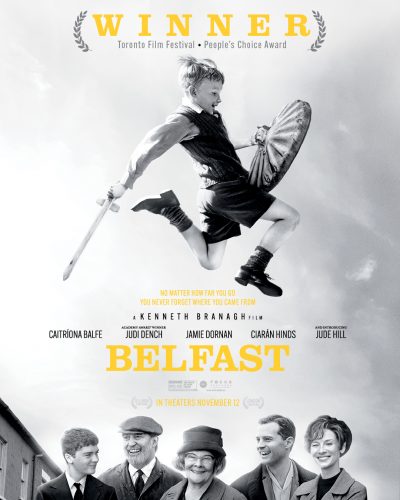
Navigating the ways of the world during our youth can be quite a challenge. When surrounded by the unfamiliar and new, virtually everything can present an opportunity for learning, a process that is sometimes confusing and bewildering. But it can also be a time of wondrous eye-opening revelation, and it can be made easier when we’re in the company of loving and supportive family and friends, as seen in the heartwarming new semi-autobiographical memoir, “Belfast.”
Such are the circumstances of nine-year-old Buddy (Jude Hill), the younger of two sons born to working class parents (Caitríona Balfe, Jamie Dornan) in Belfast, Northern Ireland. Buddy lives in a tight-knit neighborhood that’s home to his extended family and assorted friends. Everyone gets along just fine, despite whatever differences might distinguish them, making for a harmonious and happy environment, an ideal setting for nurturing little ones as they grow up. But suddenly and quite unexpectedly, that sense of peace is shattered, irrevocably changing the nature of the neighborhood and young Buddy’s outlook on life.
In August 1969, all hell suddenly breaks loose when political extremists operating under the guise of religious righteousness begin combatting one another in the streets of Buddy’s neighborhood. One moment he’s outside happily playing with friends, and the next he’s running for cover to protect himself from flying shrapnel and wide-eyed fundamentalist terrorists. And, before long, residents who once lived together in harmony are at each other’s throats, all in the name of Protestant and Catholic dogma. (So much for Christianity’s supposed peace of understanding.)
Needless to say, Buddy is more than a bit mystified. He barely comprehends much about the meaning of religion to begin with, but to now see it used as a rhetorical weapon wielded by people he has long known to attack one another completely puzzles him. In a heartbeat, his ability to freely walk the streets and live an ordinary life has evaporated, and he has no clear understanding of why.
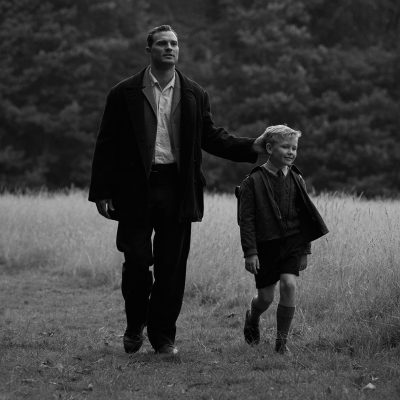
Buddy looks for insights and clarification from those around him. There’s his brimstone-spouting minister (Turlough Convery), who does little more than fan the flames of fear, a practice that religion typically does so well. Then there’s his older brother, Will (Lewis Askie), who’s generally more interested in the secular than the spiritual. Ma does her best to offer comfort and meaning, although that’s frequently difficult given the many challenges she faces in trying to hold the family together, namely, the insane mayhem that has erupted around her, the dangerous influence of a teenage troublemaker (Lara McDonnell) and Pa’s recurring absence to work a job in England to earn enough money to support the household. In light of those shortcomings, perhaps the most meaningful advice comes from Buddy’s loving grandparents, Granny (Judi Dench) and Pop (Ciarán Hinds), who adore the youngster and try to provide a buffer between the lad and the changed world in which he now lives.
In the meantime, despite this troubling backdrop, Buddy attempts to continue enjoying whatever modest pleasures are still available to him, such as occasional visits to the cinema to watch movies that provide temporary diversions from day-to-day troubles, such as the delightfully whimsical “Chitty Chitty Bang Bang” (1968), as well as broadcasts of his favorite American TV shows, like Star Trek. He also carries on with the life lessons that often arise in childhood, such as navigating the ways of his first romantic crush, in this case with the lovely young Catherine (Olive Tennant).
Still, despite these pleasant distractions, Buddy and his family can’t escape the circumstances unfolding around them, especially when they flare up and reach such degrees of intensity that UK troops now walk the streets in an effort to keep the peace (or at least prevent it from getting any worse). What’s more, these conditions make it increasingly difficult to instill cherished values, such as tolerance, kindness and nonviolence, all of which Buddy must address in the midst of an uncertain daily existence. And, as this situation continues to intensify, the family soon faces some hard choices about their future, difficulties that are hard enough on the adults in the household, let alone on a sensitive, inquisitive nine-year-old.
How matters play out will undoubtedly leave a significant and lasting impression on everyone but especially on one whose impressions are still at a precarious formative stage. What will this mean for Buddy and his family? That’s what hangs in the balance on the increasingly dangerous streets of this once-peaceful Northern Ireland community, a legacy that will take decades to fully sort out.
Picture yourself as a nine-year-old like Buddy, a happy, carefree youth who clearly enjoys his life and surroundings. But then try to imagine yourself as that same youngster who’s suddenly thrust into a world of chaos and seemingly irrational animosity. What is one to make of that? Can any sense realistically be made of such illogical events and recklessly dangerous conditions? Why did circumstances change as they did, and was there even a need for it?
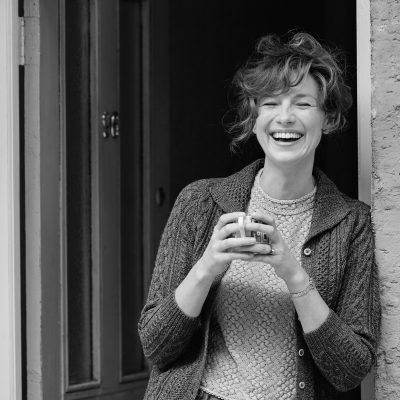
Those are legitimate questions, to be sure, and, for someone with limited life experience, answers are hard to come by. That’s important in determining what one thinks about the world, specifically what he or she believes about the nature of existence. And such beliefs are significant in that they help to frame one’s outlook about the nature of reality, a perspective that can easily become self-perpetuating through the power and persistence of those beliefs. Such notions provide the foundation of the conscious creation process, the philosophy that maintains we manifest the existence we experience through those underlying building blocks.
Under conditions like these, one can only wonder what Buddy thinks. It indeed comes as no surprise that he’s confused. Growing up can be perplexing enough even under the best of conditions, but, when the process is complicated by circumstances as extraordinarily unusual and atypical as these, it’s hard to fathom how someone so impressionable can realistically keep his wits about him or avoid falling under corrupting undue influences.
For Buddy, this is particularly critical when it comes to shaping his values, especially those that will affect his interaction with others and the life he creates for himself, in all likelihood for the rest of his days. However, given the conditions he’s being exposed to on a daily basis, how realistic is it to expect that he’ll be able to appreciate the virtues of kindness and civility when those around him are throwing rocks and beating one another with tire irons? What beliefs will arise from continuous exposure to such behavior? And can their negative influences be sufficiently counteracted to produce a contrary response?
It seems logical to assume that Buddy would be especially baffled by the mixed messages simultaneously being served up by devout religious figures and those who are engaged in unspeakable acts of violence in the name of religion. When impassioned assertions like “love thy neighbor” run headlong into acts of neighbors zealously beating one another bloody, it may be more than a little difficult to figure out which action to embrace, and the subsequent impact on the formation of one’s beliefs can thus become even more precarious. What kind of a life and future awaits someone like Buddy under those kinds of conditions?
Perhaps most fundamentally, kids like Buddy are left to wrestle with the most puzzling question of all – why is all this happening in the first place? Why did Protestant and Catholic neighbors who lived together in harmony for years suddenly become totally irrational and begin attacking one another for no apparent reason other than differences in their religious practices? Is it possible there’s more to this than just reading from different liturgies?
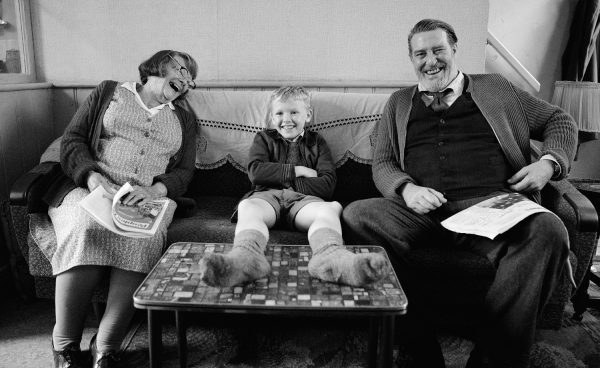
Getting to the underlying intents is crucial in understanding such matters, something that may be difficult for inexperienced youngsters to grasp and appreciate. But it’s at times like that when actions begin to speak louder than words, and, if Buddy and his peers truly want to understand what’s at work, they should pay close attention to what’s unfolding. That becomes apparent, for example, in the actions of his militant Protestant neighbor Billy Clanton (Colin Morgan), a young thug who, with his sidekick muscle, McLaury (Conor MacNeill), seeks to bully the neighborhood into submission. Clanton wants to rid the neighborhood of the long-established “Catholic vermin” who live on the block, recruiting whatever backing he can get, including Buddy’s dad, by any means possible. The experience sets quite an example and provides a powerful teaching moment, one that, one would hope, provides lads like Buddy with a chance to learn how to differentiate right from wrong – and set him on the proper course for the future.
Fortunately, young minds often work like sponges, soaking up much of what’s transpiring around them, providing them with considerable input for making up their minds and formulating suitable beliefs. One can only hope that Buddy gleans the essence of such situations and translates it into meaningful insights of his own, beliefs that he can draw upon in shaping a positive existence for himself and eschewing the negative examples being set by those who let their passions and prejudices get the better of them and try to bend the world to their knees, needlessly wreaking havoc in the process.
While writer-director Kenneth Branagh’s latest offering might not always feel as fully fleshed out as it could have been, for what’s here, this semi-autobiographical memoir about the filmmaker’s challenged upbringing in this troubled Northern Ireland city hits all of the right notes and does so in a thoughtful, entertaining, well-balanced manner. Told from the perspective of its youthful protagonist, “Belfast” plumbs material that many viewers can easily relate to – family dynamics, first loves, the joy of community and the endearment of adoring grandparents. In doing so, the film comes across like a fusion of director John Boorman’s “Hope and Glory” (1987) and the nostalgic TV series The Wonder Years as it tells the story of a sprightly young lad attempting to grow up as normally as possible in the face of a senseless religious-based civil war.
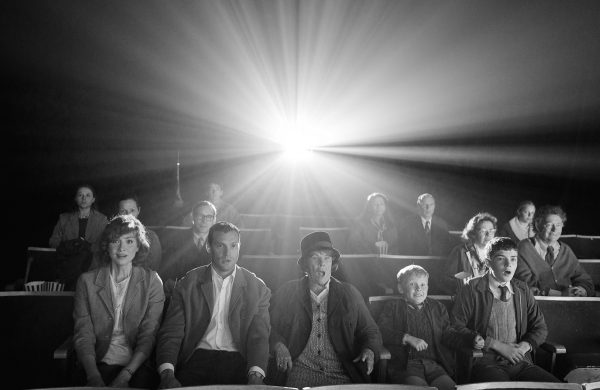
Some detractors have contended that this release “isn’t political enough,” but politics aren’t the focus of this film. Others have criticized it as a vapid feel-good movie, but that designation is far too glib considering the backdrop under which the story takes place, one that gives the picture an edge and serves as a constant reminder of what can lurk in the underbelly of our reality, no matter how otherwise pleasant our existence may seem. Admittedly, there are times when viewers are left somewhat wanting for a little more dramatic depth, but the finely penned screenplay nevertheless delivers more than its share of emotionally touching moments and gentle humor, as well as evenly paced, well-developed treatment of its various story threads, all of which are suitably wrapped up by film’s end. All of this is beautifully brought to life by the picture’s superb black-and-white cinematography, its lively and fitting Van Morrison soundtrack, its skillful, sensitive direction, and the excellent performances of its fine ensemble cast, particularly newcomer Jude Hill, Irish actress Caitríona Balfe, and veterans Judi Dench and Ciarán Hinds.
“Belfast,” which is currently playing theatrically, has already come up a big winner in terms of awards season nominations, with more almost assuredly to follow. In the Critics Choice Award competition, the film picked up a whopping 11 nominations, including best picture, best supporting actress (Balfe), best supporting actor (for both Hinds and Dornan), best acting ensemble and best young actor/actress (Hill), along with nods for achievements in directing, original screenplay, cinematography, editing and production design. Similarly, the picture earned seven Golden Globe Award nominations for best dramatic picture, director, screenplay, original song, supporting actress (Balfe) and supporting actor (for both Hinds and Dornan). In addition, the National Board of Review bestowed two honors on this release as one of 2021’s Top Films and for Hinds’s supporting actor performance. And, to round things out, “Belfast” received a special award from the American Film Institute. Viewers can certainly expect more accolades to follow.
Growing up should be a period full of joy and wonder, one in which we learn about life, the ways of the world, what matters most and important values to live by. It’s a time when we should be able to focus our energies and attention on what truly matters most, free from distractions and hindrances that can keep us from accomplishing this goal, one that will provide us with a crucial template for what we create and experience for the duration of our days in this thing we call physical existence. This is not to suggest that we should be confined to some sort of isolated, sanitized bubble free from the realities of life; indeed, there are significant life lessons to be learned from the challenges and difficulties of existence that will help to prepare us for what may lie ahead, a point made apparent in many of the sometimes-gruesome fairytales we’re told in our youth.
But, that aside, childhood should nevertheless be a time when we’re able to assess and examine the considerations that help us to make this a better place for us all, especially when it comes to forming the beliefs we hold to make that possible. If we miss out on that due to having to address concerns outside those primary objectives, we come up the losers in the end. And what a tragedy that would be, not just for us as individuals, but also for what might be for all of us, an outcome that may be difficult if not impossible to overcome and that could carry through and become part of a wider world at large. There’s simply too much at stake to let that happen, and “Belfast,” with its timeless story, makes that more than abundantly clear.
Copyright © 2021, by Brent Marchant. All rights reserved.



